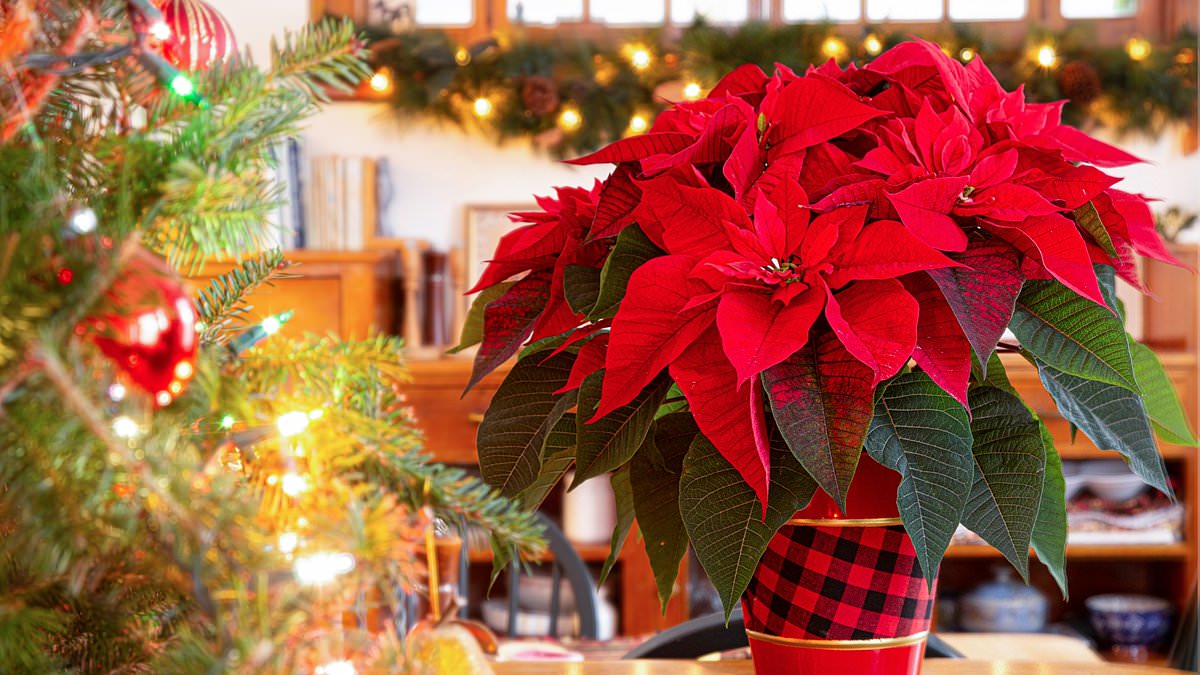Traditional Christmas poinsettias are in short supply and more expensive this year, shoppers are being warned.
Eight million of the red-leaved plants have traditionally been sold in Britain annually, around half of them also cultivated here.
But a ‘perfect storm’ of problems for growers has reduced supply by around a million this year, pushing up prices in an end to the £1 poinsettia – with some retailers selling them for £8.
Plant health inspectors have destroyed hundreds of thousands of the distinctive blooms to stop the spread of a voracious pest that decimate food crops.
And with huge numbers also being lost through failures of new peat-free compost, the double blow has led some major nurseries to give up poinsettia production.
The pest that can steal a ride into Britain on imported poinsettias, grown mainly in Holland, is the whitefly or Bemisia tabaci.
Officials are carrying out stringent border checks, as well as increasingly inspecting plants at UK nurseries and in supermarkets, amid fears that the pest could amove on to tomato and other greenhouse crops.
Derek Jarman, chair of the British Protected Ornamentals Association, which represents UK growers, said: ‘If inspectors find one live fly on a single poinsettia, the whole batch in a greenhouse, warehouse or lorry is destroyed.
‘Some of the big nurseries stopped growing poinsettias in the second half of this year and the Dutch do not want to run the risk of losing lorry loads.
‘Peat-free compost failures have made it a double whammy. There are around a million fewer UK-grown poinsettias alone this year.’
Leading nursery Volmary, of Wisbech, Cambridgeshire, grows 500,000 poinsettias a year for retailers including Waitrose, Marks & Spencer and Asda.
But it lost 70,000 poinsettias worth £150,000 last year after an inspection by the Animal and Plant Health Agency, a Defra agency, found whitefly to be present.
And a failure in peat-free compost despite apparently successful previous trials is set to wipe out between 50,000 and 100,000 of this year’s crop.
Managing director Wayne Eady said: ‘Losing so many is devastating for eating into your margin.
‘A small amount of this fly can cause massively disproportionate cost.
‘And it is not proven what the problem is with peat-free compost containing coir and wood fibre but we’re seeing a lot of dead and stunted plants.
‘It makes growing poinsettias high risk for low reward. We don’t know what to do next year.’
In recent years, Christmas shoppers could snap up poinsettias for as little as £1 but ‘the days of the £1 poinsettia are done’, according to Mr Eady.
Marks & Spencer alone typically sells over 700,000 UK-grown poinsettias – accounting for a quarter of all its sales of plants – during the festive season.
This year, it is offering £8 poinsettias in Emma Bridgewater earthenware pots.
Budget supermarket Lidl is selling poinsettias for £2.99 and Asda for £3.50.
The poinsettia season is one of the shortest and they remain in stores for roughly eight weeks – from the end of October until the end of December.
Native to Mexico, the poinsettia was popularised in Victorian times by Joel Roberts Poinsett who gave the flower its Westernised name.
He took cuttings to his home in South Carolina and began cultivating the plants and exporting them to friends and botanical gardens around the world.
One of the biggest markets developed in England where the tradition for the bright blooms has grown and grown down the years.
Given strict supermarket specifications and competitive pricing, UK growers have struggled to compete with efficient mass production, particularly in Holland.
Poinsettias are notoriously delicate and they are often discarded after the festive season.
Experts advise that a carefully controlled temperature of 15-18C should optimise growth and to keep the plant away from draughts in bright, indirect sunlight without overwatering.
